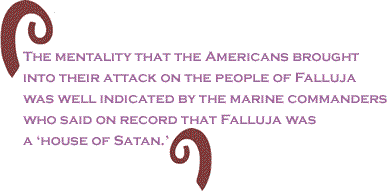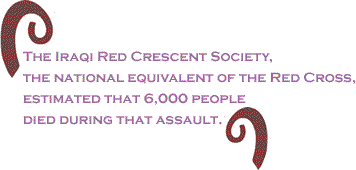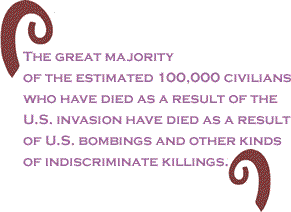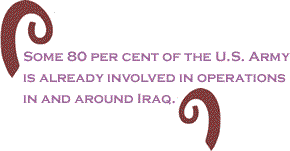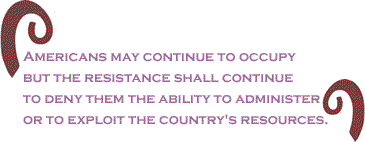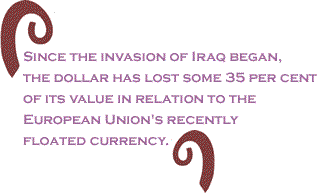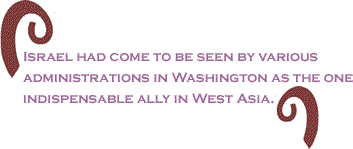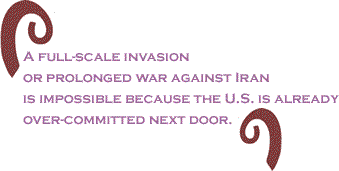
|
|||||||||||||||||||||
 |
|||||||||||||||||||||
 |
|||||||||||||||||||||
 |
Now, more than ever, African Americans and people with sense must disconnect from the insane conversation that passes for news in the United States. Fortunately, the Internet exists, allowing us to connect with the global conversation, which is far different than the foul discourse we are drowning in, here at home. The U.S. has passed a point of no return, in terms of world reputation and leadership. No one is listening to the bizarre rantings of the Bush crew except his own crazed base in the heartland of racism and reaction, and the corporate media that urge us to leap into a Grand Canyon of lunacy – a kind of suicide. We at The Black Commentator have spoken at length of the “redlining” of America; a movement among the elites of foreign nations to sever Washington’s outstretched tentacles, which threaten to strangle the planet. The world is engaged in a furious dialogue on how this essential task shall be done, but we hear none of it in American media – an insulating bubble. But there
are other voices, which We are grateful to Aijaz Ahmad for his analysis of declining American power, an analysis that the people of India can freely consume in the pages of The Hindu, the Indian national newspaper. There is a an international conversation going on that Americans are not privy to, because of the censorship practiced by our corporate media. Whether we hear it or not, the bell is tolling. The war in Iraq is costing the Americans dearly in every respect. A demonstration of the invincibility of American power has come together with the overwhelming evidence of the limits of American power on the ground. The first four years of the presidency of George W. Bush, which forced upon the world not only the invasions of Afghanistan and Iraq but also a structure of globalized militarism to supplement corporate globalization, coincided almost exactly with the four years of the second Palestinian Intifada and Israel's all-out war against the Palestinian population. Prospects for the world during the next four years of this presidency are, if anything, more grim. And, West Asia shall remain, as it has been, at the very epicenter of this imperial storm. Any extended discussion of the current crises in West Asia should in any case be prefaced with a brief summation of the situation in which the United States, the instigator and chief actor in these crises, finds itself. The re-election of Bush to a second term on November 4 was immediately followed, starting on November 7, with a massive assault on Falluja, as was expected, and was supplemented with equally murderous attacks on a number of cities and towns across the so-called "Sunni triangle" in Iraq. On that same day, November 7, the puppet government of Prime Minister Iyad Allawi declared that all Iraq except the Kurdish-run areas in the country's north was under martial law, banning all protest rallies and street demonstrations. He also announced that a 24-hour curfew applied in Falluja, to be observed by everyone in the city except the invading U.S. and puppet Iraqi troops, thus making any Fallujan who is not in a residential building a free-fire target.
Anticipating this assault, some 200,000 residents of Falluja had
fled the city even before the bombings began, along with all the
seasoned fighters of the resistance who left behind only a relatively
small number of relatively inexperienced Everyone knew that all this was going to happen, and no one was able to stop it. In a letter sent on October 14 to U.N. Secretary-General Kofi Annan, the Falluja Shura Council, which administers the city, had pleaded: "In Falluja, [the Americans] have created a new vague target: al-Zarqawi. Almost a year has elapsed since they created this new pretext and whenever they destroy houses, mosques, restaurants, and kill children and women, they say, `we have launched a successful operation against al-Zarqawi'. The people of Falluja assure you that this person, if he exists, is not in Falluja... and we have no links to any groups supporting such inhuman behaviour. We appeal to you to urge the U.N. [to prevent] the new massacre which the Americans and the puppet government are planning to start soon in Falluja, as well as many parts of the country." Annan himself took the extraordinary step of writing to Bush and United Kingdom Prime Minister Tony Blair not to undertake these attacks, as did the Association of Muslim Scholars, an organization of the Iraqi ulema representing 3,000 of the country's mosques. Even Ghazi al-Yawar, the interim President of the puppet regime in Iraq, had opposed the impending action: "I completely disagree with people who see a need to settle the Falluja question through military action .. . . It is like someone firing bullets at his horse's head because a fly lands on it; the horse dies and the fly flies away." None of it helped, and the planned abomination went ahead anyway, barely 10 days after a scholarly study from Johns Hopkins University's Bloomberg School of Public Health had sent waves of shock and anger throughout the Arab world when it publicly stated that some 100,000 Iraqi civilians, mostly women and children, had died since the American invasion began in March 2003. The mentality that the Americans brought into their attack on the people of Falluja was well indicated by the marine commanders who said on record that Falluja was a "house of Satan" and those other commanders who told their soldiers to "shoot everything that moves and everything that does not move"; to fire "two bullets in every body"; and to spray every home with machine-gun and tank fire before entering them. Meanwhile, the insurgency itself shows no signs
of abating. Even as Falluja was being terrorized and flattened,
insurgents were
mounting attack in other cities such as Mosul, withdrawing their
forces from wherever the Americas attacked, and attacking wherever
the presence of the Americans and their local mercenaries was weak.
Large parts of Baghdad remained ungovernable, as did most of the
so-called "Sunni triangle,” and attacks on pipelines and supply
lines were so persistent that the U.S. command sometimes found
it difficult to keep up the gasoline supplies required for the
military operations. It was at the height of the offensive that
the U.S. announced that its military force in Iraq was to be augmented
U.S. forces in Iraq are using overwhelming firepower so as to minimize their own casualties. Even so, close to 1,500 U.S. military personnel have died in combat, and according to statistics released by the U.S. authorities, as of November 16, a total of 10,726 service members had suffered war injuries. Most observers believe that the U.S. authorities are greatly understating the number of the wounded and the real figure may be twice as high. Nor is there an infinite supply of soldiers available for massive escalation. Some 80 per cent of the U.S. Army is already involved in operations in and around Iraq, if we count not only the troops that are directly deployed at any given time but also the cycle of rotations. This problem is leading to increasing use of mercenaries through private contractors; the number of such mercenaries is said to be already topping the 40,000 mark, and as recruitments decline within continental U.S., these private contractors are recruiting from among the destitute populations of a variety of countries, all the way from South Africa to El Salvador. In the process, the Iraqi population is being subjected to unspeakable levels of suffering.
When 200,000 residents fled Falluja, neither the Americans, nor
their Iraqi puppets, nor the U.N. agencies, nor any group of non-governmental
organizations (NGOs) were there to provide them with relief and
shelter; that story is also being repeated in town after town,
village after village. Acute malnutrition among young children
in Iraq has nearly doubled The U.S. government and media ignore all such facts and concentrate instead on the bogus "elections" that are to be held as an exercise in "democracy.” It is very doubtful that an occupied country, with war raging across vast swaths of its territory, can actually have what we normally mean by elections. At present, Iraqis are living in a situation where their sovereign rights are held in something of a limbo, which began on June 28, when administrative responsibilities were transferred from the U.S.-led Coalition Provisional Authority and its appointed Iraqi Governing Council to the un-elected Iraqi Interim Government backed by the U.S., which currently serves as a puppet regime. This is the regime that is to organize the much-publicized "elections" in which Iraqis shall be voting to elect the core of a transitional legislature – the 237-member National Assembly. It is the National Assembly that will determine who serves in the executive branch, electing a President and two Deputies of State. Collectively, these three officials would form the state's Presidential Council, and must unanimously select a Prime Minister to replace the present appointee. The task of writing a durable Constitution may then begin.
All this charade has been possible because Iraq's senior Shia cleric, Ayatollah al-Sistani, decided to cooperate with the Americans and calculated that in the new communalized calculus of electoral politics which the U.S. has devised for the previously secular Iraq, the Shia groupings can collectively command a legislative majority and hence capture power without fighting for it. The main Kurdish parties have of course had an understanding with the U.S. since the early 1990s, and many of the conservative elements among the Sunni clergy had also given their grudging assent to these arrangements. However, once the destruction of Falluja got going, the Islamic party, the largest Sunni grouping, resigned from Allawi's interim government and the Association of Muslim Scholars called for a boycott of the elections scheduled for January 2005. So, the charade of the January elections is likely to witness very minimal participation from at least the Sunni segment of the Iraqi population and, at the time of writing, it is very far from clear how some of the radical Shia groupings, such as Muqtada al-Sadr and his followers, will eventually act in relation to these "elections.” A protest in Istanbul against the U.S.' policies in West Asia.
Four things about this conjuncture can be said with some degree of certainty. First, it is currently impossible to conduct normal, free and fair elections in considerable parts of Iraq, and the legitimacy of the results shall therefore be highly questionable. Secondly, regardless of the results, these "elections" shall make little difference to the conduct of the insurgency in the foreseeable future. Thirdly, the processes through which the U.S., substantially aided by the U.N., has erected the new structures of power among its clients will serve to communalize further what was until very recently a very vibrant secular culture of Iraq, and shall in the long run pave the way for the balkanisation of the country which the U.S.-Israeli axis desires for not only Iraq but also the whole of the region. Fourthly, the U.S. can certainly assemble a configuration of clients comprised of the new political elite and the newly rich who are making money out of this occupation, but the resistance shall continue to fight not only for the eviction of the Americans but also for decimating the personnel of the new state apparatus – the new Army, police and bureaucracy – which the U.S. is assembling for itself and its clients. Americans may continue to occupy but the resistance shall continue to deny them the ability to administer or to exploit the country's resources; hence the attacks not only on the Americans but also on their hirelings and the oil-related installations. The war in Iraq is costing the Americans dearly: in terms of the cumulative financial costs of occupation; in having so much of its military personnel pinned down in one little corner of the globe while the ambition was to make multiple wars across West Asia and across the globe; in terms of the loss of any kind of moral authority in consequence of the sheer savagery and criminality of its mode of invasion and occupation; and even in terms of the slow but unmistakable attrition of its personnel in Iraq, where death and injury for its citizens has become a daily occurrence and is bound to invoke a widespread rejection of this war at home, sooner or later. By contrast, none of the gains the U.S. had sought in Iraq and in the region as a whole has been realized, almost two years after Baghdad fell, seemingly so easily: not the capturing of the Iraqi oil, not the ability to use Iraq as the main military base in the region so as to begin an orderly withdrawal from Saudi Arabia, not the dream of using Iraq as a base for launching attacks against Syria, Iran, Lebanon or whatever. A demonstration of the invincibility of American power has come together with the overwhelming evidence of the limits of American power of the ground. We can now witness an imperial overreach even before they have reached very far.
Afghanistan is in this context almost not worth mentioning. That was the first and indeed a very swift occupation, but one that was grandiosely envisioned as the first of very many. The quagmire in Iraq put an equally swift end to the dream of the “very many.” In the meanwhile, a client regime of Hamid Karzai was put in place and then handed over to the North Atlantic Treaty Organization (NATO) to keep him in place. Neither Osama bin Laden nor Mulla Omar nor any other of the luminaries of the Taliban regime has been captured. Any number of Americans are running around in northern Pakistan, pretending to be catching bin Laden. My sense is that the Americans are much more interested in securing bases close to the Iranian border in Baluchistan, just in case the U.S. and/or Israel ever feels free to strike at the Islamic Republic. The pseudo-elections in Afghanistan are represented in the U.S.-inspired media as major gains for democracy – non-theocratic democracy at that – but what we mainly have is a narco-democracy, considering that opium production there, stopped by the Taliban, has reached such proportions that the crop in 2004 was the most abundant and most lucrative in the country's history. The U.S. Office on Drugs and Crime released its Afghanistan Opium Survey in late November, finding that opium cultivation had risen by 64 per cent this year alone, with a total value of $2.8 billion, and thus accounting for more than half of the country's domestic product and spreading to all the provinces in Afghanistan. No wonder that drug lords are the very backbone of the Karzai regime, notwithstanding all the pious anti-narcotics pronouncements of the client and his overlords. The evidence from Iraq and Afghanistan seems to suggest that the military conquest of the globe is not going too well. What about the imperium itself? Well, the long and short of it is that since the invasion of Iraq began, the dollar has lost some 35 per cent of its value in relation to the European Union's recently floated currency, the euro, not to speak of the yen and the yuan and sundry lesser currencies of the world. In the short run, the depreciated dollar boosts American exports, which become cheaper, and discourages foreign producers to sell their goods in the U.S., for which they would not get less, in terms of their own currency. This can help the U.S. produce more, export more, and import less, which then redresses a part of the problem with the current balance of payments. The problem, however, is that since the dollar serves not only as the national currency of the U.S. but also as the reserve currency of the world, and as the principal currency for world trade, notably oil trade, everyone wants to hold U.S. dollars and, consequently, roughly 50 per cent of the U.S. dollars are held abroad. The specter haunting the dollar today is that those foreigners who hold it – as reserve currency, as medium of trade, as a share in the U.S. economy and state debt – would get fed up with its decline and start exchanging it for some other, better valued currency, such as the euro at present. Had Saudi Arabia or Iran or Venezuela – or other oil-producing countries – traded oil in euros over the past year, their earnings would have been roughly 30 per cent higher. The East Asian banks, which prop up the dollar by buying such things as the U.S. Treasury bonds, have been losing the value of their assets, as are governments such as the Chinese government, which holds hundreds of billions of its reserves in dollars. Why should they not shift to the euro, or at least substantially diversify. At the very least, they could stop adding dollar-denominated assets to their portfolios. The nightmare in the American Federal Reserve is that any one of these major players may decide that the dollar is just not worth it, and shift, prompting other players to shift, so that the entire financial architecture that was built when the U.S. unilaterally abandoned the gold/sterling standard and effectively replaced it with the dollar would collapse. For, the unique privilege of America, derived from the fact that its national currency serves as the world currency, is that it can keep on printing dollars to finance its own huge budgetary deficits and the national debt, because the rest of the world has gone on taking over the surplus dollars for their own accumulation. What happens if the demand for the dollar collapses? Playing “chicken” with the world system
Now, obviously, no government or bank would want the American economy to go into a major, irreversible crisis because that would spell deep crisis for the global capitalist system as a whole; everyone would prefer a soft, negotiated landing for the dollar. There are two problems, however. First, the Bush administration seems unwilling to see that the depreciation of the dollar, which helps American exports, is costing others a very great deal, and the problem has to be settled through multilateral negotiations; in economic policy, as in the policy of imperialist expansion. The Bush administration prefers to act in a myopic, unilateralist fashion. Secondly, the unpredictability of markets and governments. A major Japanese bank, a major trading partner such as China, can act to simply safeguard its own interests, and thus set a trend, inadvertently, for others to follow – until it becomes a stampede. One cannot safely predict anything in so volatile a situation. It is possible to say, however, that the era of a straightforward dollar domination may be drawing to a close and the era of currency wars may be at hand. It may be in some respects a unipolar world but the lone superpower, which is facing the complexities of a war of national liberation in Iraq, may also be facing currency competitions in the financial arena. These pressures on the imperial center should also be seen in the context of certain specific features of the current power dispensation in the U.S. I wrote about two years ago that the Bush administration may be the most right-wing administration that the U.S. has had since at least the Second World War – as something of a culmination of trends set in the days of Ronald Reagan. Well, the second Bush administration, as it is taking shape after last month's elections, has moved even further to the Right. Secretary of State Colin Powell, a professional soldier, has been fired because he questioned the degree of U.S. support for Israeli Prime Minister Ariel Sharon's extremists policies and replaced with Condoleezza Rice, with her membership in the petroleum industry and loyalty to the master's policies, and the dispute between the right-wing Powell and the ultra-Right Donald Rumsfeld has been settled in favor of Rumsfeld. The Central Intelligence Agency (CIA) is being restructured so purposefully to make it an instrument of Bush and his neo-conservative inner circle, at the expense of the professionalism of its senior officials, that a number of those professionals have resigned in protest. Bush has chosen as his Attorney-General a man who had served as a senior White House lawyer over the last four years and had justified the use of torture in the interrogation of prisoners, thus implicitly upholding the systematic torture practiced by the U.S. at Guantanamo Bay and in Abu Ghraib prison. He thinks of himself as a born-again Christian and, as such, has always had an affinity with Evangelical Christianity; his re-election is owed so much to that organized tendency in his political party that he is likely to draw even closer to it. He has inherited from previous U.S. administrations the settled policy of unconditional support for all that Israel is and does; he has already endorsed the most belligerent aspects of Sharon's policy; the Zionist neo-conservatives and the Evangelical-Zionist alliance have such a hold on his administration; and Sharon has become so much a mentor and guide to him over the past three years that he is likely to go along with whatever Israel now proposes, whether in relation to the Palestinians or other elements in the region, notably Iran. In his victory speech after re-election, Bush said that he would now go ahead and proceed to finish the task he had undertaken during his first term. What was that task? As regards West Asia, that envisioned task was not limited to the eradication of the Taliban regime or Saddam Hussein's rule but the re-making of the region as a whole. Remarkably enough, the only country in the region that needed no re-making was Israel. In his very first State of the Union address, in January 2002, Bush came forward with the resonant phrase, “Axis of Evil,” in which any number of unnamed forces could be included but three names – Iraq, Iran and North Korea – did stand out. They were “Evil” because they were promoting “terrorism” and nuclear proliferation. Of these, North Korea was of course not in the region but, unlike the other two, it did possess some nuclear weapons, and could, therefore, be approached only very cautiously, all the bluster notwithstanding.
By the time Bush spoke of the Axis of Evil, Afghanistan had been occupied and the international ideological campaign to prepare the ground for the invasion of Iraq was just getting under way. As the campaign unfolded, the issues of `”terrorism” and nuclear proliferation were supplemented with the objectives of eradicating Islamic fundamentalism and totalitarianism, while promoting “democracy” and human rights. On these grounds, then, any or all countries of West Asia could be objects of U.S. intervention – humanitarian intervention in the sense that it was designed to eradicate evil and promote virtue. It was during this process, while an interventionist new policy was being fashioned for West Asia as a whole that a qualitatively new relationship between the U.S. and Israel was forged. Since at least 1967, if not before, Israel had come to be seen by various administrations in Washington as the one indispensable ally in West Asia upon which the U.S. could rely as a bulwark against the turbulence that was sweeping other countries in the region, where some regimes were already hostile towards the U.S. (Gamal Abdul Nasser's Egypt, for example) and others could arise in countries which were allies at the time but were prone to unpredictable shifts (as happened in Iran with the sudden fall of the Shah and rise of the Islamic Republic). Implicit in that alignment was the idea that Israel, as a surrogate and regional sub-imperialist power, could always intervene against regimes that the U.S. disliked but could not punish directly, as Israel did unilaterally invade Egypt and Syria in 1967. It was in view of this very special kind of alignment that Israel was given immense amount of U.S. funds and weaponry but was never held accountable for its cruelties against the Palestinians, its development of nuclear weapons or its routine defiance of Security Council resolutions. But the years of the Bush presidency witnessed something more. The key element here was that a group of neo-conservative
and Zionist ideologues – Wolfowitz, Richard Perle, Robert Feith, and
so on – who had occupied middle-rung positions in the Reagan administration
and had subsequently grown very close to some of the key leaders
of the Likud party in Israel, notably Benjamin Netanyahu, came
to occupy key positions in the Bush administration, especially
in the Pentagon, and began fashioning policies for the U.S. that
were remarkably similar to the ones that Sharon had been advocating
for some two decades. Vice-President Dick Cheney was a senior member
of this group and in some ways the protector and promoter of their
ideas. Sharon himself had by then risen to become Prime Minister
in Israel, and in a flurry of visits to Washington he now became
Bush's mentor in delineating an over-all policy for the region.
Something of a sea change now occurred in the relationship between
the interlocutors. Israel had until then been a supplicant for
U.S. weapons and finances, and had wielded influence on U.S. policy
mainly through the pro-Zionist lobby in Washington and the Zionist
organisations, which kept a tab on U.S. Congressmen. Now, with
the ascendancy of Zionist neo-conservatives right up to the office
of the Vice-President, it was the U.S. policy that came to be shaped
increasingly in the shadow of Israeli policy. The events of September
11 proved crucial in this turn of events.
The vilification of all things Arab and/or Islamic had gone through three phases in the U.S. The first was the period of Nasserist anti-imperialist, Arab nationalism, when secular nationalism itself was seen as a threat to Western interests and to the very regimes, such as the Saudi regime, which were protecting those interests. The second was the phase when the Organization of Petroleum Exporting Countries (OPEC) suddenly raised the price of petroleum in the wake of 1973, and the Western media were studded with daily images of the Arab, bearded and dressed in Bedouin clothes, turning off the tap at the American petrol pump. The third was the phase that began with the Islamic Revolution in Iran that overthrew the monarchy which had been, next to Israel itself, America's main ally in the region. After September 11, all these images got rolled into one, that of a transnational Muslim terrorist out to destroy the American way of life in a gigantic clash of civilization, with no regard to the fact that the particular kind of terrorist who had rammed those hijacked planes into the World Trade Center had been bred by the Americans themselves for purposes of their own jihad against the communist infidel in Afghanistan. Two things now happened. One is that since this new “terrorist” was a transnational Muslim, war against him was also to be waged in country after country, across West Asia and even in pockets as far away as Bali or the Philippines. Hence the neo-conservative dream of capturing Baghdad, then Damascus, Riyadh, and finally Teheran. Second, and crucially, Sharon was able to convince his Anglo-Saxon interlocutors, and Bush in particular, that the Palestinian was the paradigmatic terrorist, and no amount of repression of the Palestinian could ever be considered excessive.
The four years of the Intifada, which began on September 28, 2000, coincided almost exactly with the first four years of the Bush presidency. The most reliable figures that I have seen conclude that 1,008 Israelis and 3,334 Palestinians have been killed during these four years. Eighty-two per cent of the Palestinians killed have been civilians, of whom 621 were children below the age of 17, and 10,000 Palestinian children have been injured. The majority of the civilians killed were shot in the head or the upper body. During the same period, Israel has followed the policy of targeted killing, that is, pre-meditated assassination unrelated to any kind of combat, which has taken 424 lives. Economic blockades and dislocations caused by the Israelis have resulted in the fact that 30 per cent of all Palestinian children now suffer from malnutrition, more than one billion worth of Palestinian infrastructure has been destroyed, Palestinian gross domestic product (GDP) has been cut in half, the price of water has tripled, and an average Palestinian consumes one-fifth of the water consumed by an average Israeli. Occupied Palestinian roads are criss-crossed with roads on which only Jews are allowed to travel, and the wall that the Israelis have built in the name of their own security zigzags through Palestinian territory, is three times as long and twice as high as the Berlin Wall, separates people from their own communities, their work place, hospitals and schools. The settled policy of demolishing Palestinian houses in the service of Israeli interests has meant that in Rafah alone, for example, an average of six homes are demolished each day. One could go on reciting details of such atrocities. But the single slogan of "terrorism" is used in Israeli as well as American and British media to excuse the Israelis and blame the Palestinians en masse. Successive U.S. administrations have condoned all kinds of Israeli atrocities and shielded Israel from any accounting in international fora. The Bush administration has gone much further, however. Unlike any previous U.S. administration, and in direct violation of numerous Security Council resolutions, Bush has declared that the Palestinian refugees have no right to return to their homes in Israel but will have to be accommodated in the Palestinian territories, and that in any final settlement Palestinians cannot expect to gain the territories that were given to them by the U.N. Partition Plan of 1949 or even all the territories they lost in 1967. He has gone further and endorsed Sharon's plan to annex large parts of the West Bank, and has barely stopped short of endorsing Sharon's overall plan which gives to the Palestinians merely 11 per cent of the land of historic Palestine, exactly half of what they had as late as 1967. In short, Israel has an absolute right to do as it wishes, in violation of every clause of the Fourth Geneva Convention and numerous U.N. resolutions. Yasser Arafat died just as George W. Bush was getting re-elected for a second term in office. As the Palestinian people lost the one man who had symbolized their nationhood for 35 years, the Western media were filled with virtual glee that there now was a chance for a new leadership that would be acceptable to Israel as a negotiating partner. And, indeed, Mahmoud Abbas (also known as Abu Mazen), who has been in close touch with the Israelis for over a decade and is known to be a notoriously corrupt man, soon emerged as the Fatah's candidate for the presidency. The only man who could fight an election against Abbas, Marwan Barghouti, is in an Israeli prison serving a sentence amounting to five life-times. When Barghouti's wife filed papers of his candidacy on his behalf, Israeli authorities immediately said that he would not be acceptable as a Palestinian President. Israel may yet get a successor of Arafat with whom it can make peace – on its own terms. Will such a peace endure? Most unlikely. There shall then be yet another Intifada, just as the resistance in Iraq shall continue regardless of any puppet regime that might arise there. First Strike, or Strike Out
Coordination between the U.S. and Israel is so close that it now becomes impossible to distinguish between the two. Israelis have trained the Kurdish Peshmargas under U.S. tutelage, and their forces are said to be active on Turkish territory adjoining Iran. Israelis have even trained U.S. forces deployed in Iraq, teaching them the techniques of urban warfare they have deployed in such operations as in Jenin and Ramallah, and which the U.S. has followed in Falluja. If the U.S. itself deployed modified Israeli tanks and bulldozers in Iraqi towns, it has also given to Israel state-of-the-art deep-penetration bombs, known as "bunker busters" for a possible Israeli attack on Iran's nuclear installations. Indeed, both the U.S. and Israel have threatened strikes against Iran, and a large number of newspapers, from The Jerusalem Post to The Los Angeles Times, have reported that both countries have carried out simulation exercises in preparation for precisely such strikes. Will there be such a strike, by one or both of them? It would be foolish to predict one way or the other. Everyone knows that the U.S. did not invade North Korea because it had nuclear weapons but invaded Iraq because it did not. In context, one can believe that Iran actually is trying to develop such a weapon. The U.S. is determined to overthrow the current dispensation in Teheran, and the possibility that Iran may succeed in breaking Israeli monopoly of nuclear power in West Asia gives those designs a special urgency. But is it doable? A full-scale invasion or prolonged war against Iran is impossible because the U.S. is already over-committed next door, in Iraq, while Iran has real armed forces and fairly advanced missiles with a formidable range. Moreover, it seems to have made something of a devil's pact with the U.S.: so long as Iran is left alone in peace it will restrain its friends among the Shia clergy in Iraq. By the same token, any strike against Iran shall bring forth an immediate mass Shia uprising in Iraq, in addition to the Sunni one. A prudent leader in Washington would keep the peace with Iran and would also restrain Israel. Bush, however, did invade Iraq against the advice of his own Chief of the Army Staff and without taking into account the consequences. The same imprudence, combined with the Israeli fear of a nuclear-armed Iran, may yet lead to targeted strikes. News reports seem to suggest also that the U.S. is willing to take another leaf out of the Israeli book, namely that of targeted assassinations. In this scenario, strikes against selected targets would be combined with operations to kill the key leaders and thus create deliberate chaos in Teheran. That would amount to real madness, since the war shall then spread not only to Iran but also, inevitably, to Syria and Lebanon. But that too is part of the neo-conservatives' prescription: a prolonged period of chaos, warfare and dismembering of the present state structures in West Asia's Muslim countries, followed by the break-up of every state into small, ethnically defined enclaves, with Greater Israel dominating the whole. |
| January 27 2005 Issue 123 |
|||||||||
|
|||||||||
|
|
|||||||||
| Printer Friendly Version | |||||||||
 |
|||||||||
 |
|||||||||
 |
|||||||||
| |
|||||||||
| |
|||||||||





















